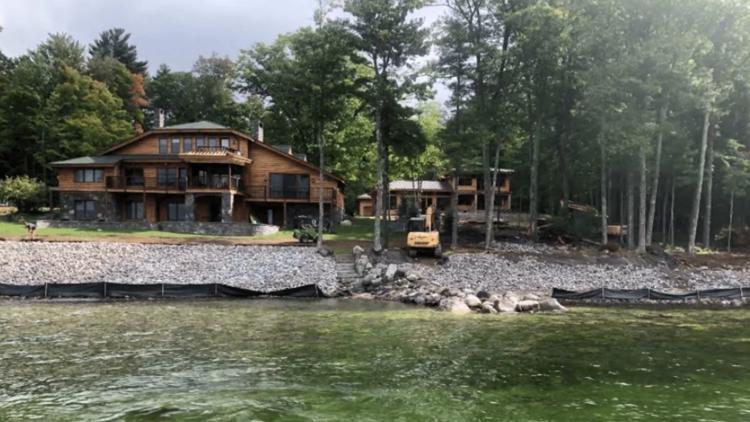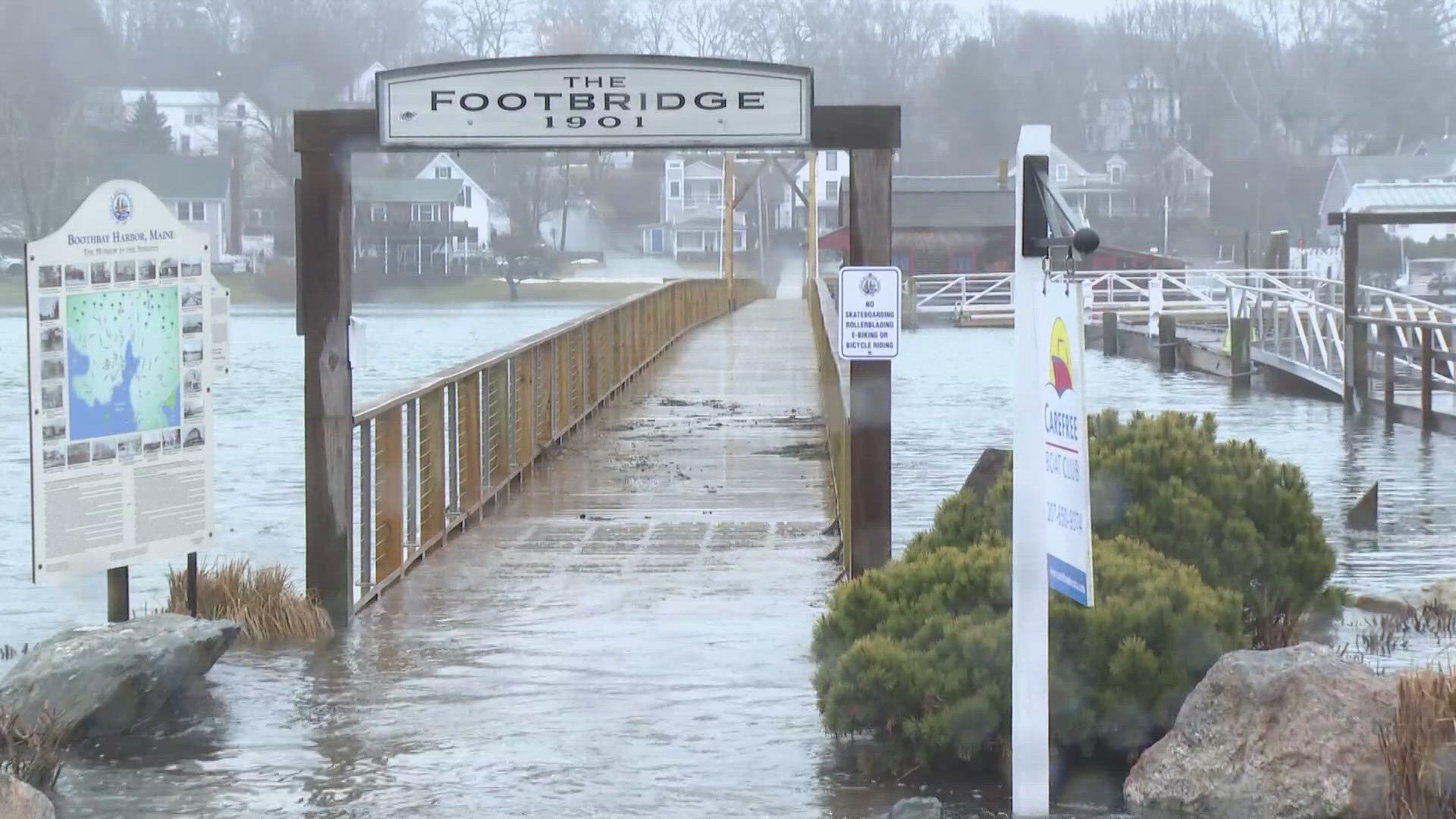MAINE, USA — The town of Raymond has spent three years trying to hold a developer and his contractors accountable for violating shoreland zoning provisions.
Officials claim the developer replaced 400 feet of trees and other vegetation along Sebago Lake with stones, which goes against local provisions on tree removal and shoreland construction.
The battle has played out in the courts, with appeals drawing out the process. The town had no way of forcing the developer to make a change, and officials and residents were left wondering if their legal expenditures would ever be reimbursed.
Local officials and lawmakers say this shows the shortcomings of the state’s shoreland zoning ordinance: Municipalities are expected to enforce the rules but don’t have the tools to do so. State environmental agencies also have limited enforcement power.
Two new bills aim to change this. One would give municipalities more immediate power in enforcing the state’s shoreland zoning ordinance, and the other would empower state agencies to issue stop-work orders when violations are identified.
Both outline steep financial penalties for landowners or developers who flout environmental regulations.
“It’s an extra couple of tools that (towns) can use to resolve these issues and not have them explode exponentially,” said the shoreland zoning bill’s sponsor, Sen. Tim Nangle, whose Cumberland County district includes Raymond.
Under L.D. 2101, Maine municipalities and the state’s Land Use Planning Commission would have the authority to punish developers who violate the shoreland zoning ordinance by revoking or suspending their permit until the issue is corrected and related penalties are paid.
A property owner with outstanding violations would be prohibited from acquiring additional development permits on the property where the violation occurred. Nangle said the stipulation was drawn up because the Raymond developer had inquired about a new development permit while his violations were outstanding.
“He knew what he was doing was wrong,” Nangle said. “When the town notified him or his holding company of the violation, he said, ‘Will this affect me getting any building permits?’”
Nangle said officials then realized that withholding other permits was “probably a decent way to encourage them.”
The bill also gives municipalities and the LUPC the power to file a civil suit against a violator and recover legal fees or the cost of correcting a violation.
Officials could also claim a lien against the land, keeping the violator from selling the property and escaping responsibility. Lastly, an amendment would require someone selling the property to disclose actual or alleged violations of shoreland zoning rules.
“With the real estate lien, the town will know that eventually they’ll get their money,” Nangle said.
Nangle told The Maine Monitor that he understands from his time on the Windham town council how little enforcement power municipalities have. He said the state would pass environmental regulations — like the shoreland zoning ordinance — and require towns to adopt them as part of their codes.
“What the state never did was give the towns any tools to enforce these rules,” Nangle said. “So what happened in Raymond is an event that probably happens all over the state every now and then.”


Donald Buteau, the Raymond property owner accused of shoreland zoning violations, disputed Nangle’s description of his request to apply for a permit after the violations were identified. He said the timing of his application was based on his interpretation of local ordinances.
He also said he opposed the new legislation.
“L.D. 2101 is a gross overreach of government power when the law should require towns to talk in good faith regarding a solution,” Buteau wrote. “Instead this is open hunting season for lawyers representing the town.”
Buteau, the contractors and town recently reached an agreement to resolve the violations. It provides the town monetary compensation and assures restoration of the Sebago Lake site, according to an attorney for the town.
Rebecca Graham, senior legislative advocate for the Maine Municipal Association, said during a bill hearing that the property lien would give small towns the ability to pursue enforcement.
“If the town is able to place a lien on that property through this process, then the community knows they will recoup those expenditures,” Graham said.
Currently, small towns have to ask residents for more funding without necessarily knowing they’ll be compensated by the violator, forcing residents to weigh whether it’s worthwhile to pursue enforcement of the degraded natural resource, she said.
Even for the LUPC, the agency that oversees zoning and permits in the state’s unorganized and deorganized territories, enforcing shoreland zoning rules can hamstring its other functions, according to the executive director, Stacie Beyer.
“A lengthy, complex court proceeding could quickly draw down on the LUPC’s … funds and impact the agency’s ability to pay for other critical agency expenses,” Beyer said.
Lawmakers said this measure should be a last resort. The bill requires officials to give a landowner and any occupant written notice of the violation and 10 days to correct it before taking action.
Only two members of the state and local government committee voted against the bill, Rep. Jeffrey Adams, R-Lebanon, and Rep. Joseph Underwood, R-Presque Isle. Following his vote, Underwood said the bill restricts property rights.
Another Republican on the committee, Rep. Randall Greenwood of Wales, also expressed overreach concerns. He ultimately decided to vote for the bill after clarifying the appeals process.
The bill, passed by both chambers, will next be considered by Gov. Janet Mills.
Meanwhile, another bill that would further expand the LUPC’s enforcement actions and those of the Department of Environmental Protection is making its way through the legislature.
Presented by Sen. Stacy Brenner, D-Cumberland, L.D. 2253 would give both agencies the power to institute a stop-work order on a site when a development activity meets two criteria: it violates a permit or state statute and it harms a natural resource. Releasing large amounts of sediment into a sensitive wetland, for instance, would meet the criteria.
Developers who failed to stop their work could be fined up to $5,000 per day. The order would last for two weeks or until certain terms were met, with an opportunity to extend it another four weeks. The order could be appealed but would remain in effect until otherwise ordered by a court.
As with the shoreland zoning bill, officials from the LUPC and DEP argued that the stop-work order bill would help agencies respond more quickly to reports of environmental degradation.
In a hearing last month, LUPC and DEP officials cited instances where a stop-work order could have averted significant erosion and sediment release into wetlands, as well as a major fish kill.
In August 2014, a mile-long stretch of the Roach River in Piscataquis County had its flow cut off for 10 days when a dam owned by the Appalachian Mountain Club was shut for reconstruction, the Bangor Daily News reported at the time.
The aftermath was significant — killing wild landlocked salmon and brook trout.
“If we had stop-work authority, we could have stopped construction and returned flow to the stream, saving some of the fisheries resources,” said Beyer, the LUPC executive director.
Beyer also spoke of an incident at a clean-up site in Sandwich Academy Grant Township, in Somerset County, where a Canadian Pacific Kansas City train derailed last April, leaving fuel, industrial fluids and remnants of container cars in its wake.


Both the DEP and LUPC supervised the company as it cleaned the wreckage. Just a couple of weeks after the derailment, officials received reports of sediment entering the Moose River from the clean-up site.
“The access road was being used, it turned into a mud-run,” Beyer said. “There was damage to the wetlands and to the Moose River … for multiple days before we could finally get them to use an alternate route to the site.”
The only enforcement option was to issue a notice of violation to CPKC, which Beyer and Mark Stebbins, the enforcement director for DEP’s Land Bureau, said was inadequate.
In a statement, a CPKC spokesperson said the company has submitted a restoration plan for the incident site and is awaiting regulatory approval to begin work.
“Throughout CPKC’s response, the safety of personnel at the site and protection and restoration of the environment have been our priority,” spokesman Terry Cunha wrote.
In cases where violators ignore agency recommendations, the only way to pursue compliance is through lengthy court proceedings.
“When construction continues even after violations have been identified, it can cause further damage to protected natural resources and higher costs to ultimately remedy that damage,” Stebbins said at the hearing.
Like with the shoreland zoning ordinance bill, lawmakers and agency officials recognized the stop-work order as a tool to use after all other options are exhausted — noting that most violations can be resolved with agency guidance.
“The department works regularly with people to help them understand the requirements of Maine environmental law and rules, and appreciates when good communication is all that is needed for timely correction of identified violations,” Stebbins said.
The stop-work order bill was adopted Tuesday by the Senate and the House on Wednesday, and awaits an enactment vote from both chambers.
This story was originally published by The Maine Monitor, a nonprofit and nonpartisan news organization. To get regular coverage from the Monitor, sign up for a free Monitor newsletter here.



